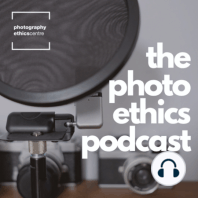2 min listen
Annie Tritt: On intentions and impact
ratings:
Length:
37 minutes
Released:
Sep 15, 2022
Format:
Podcast episode
Description
In this episode we talk with Annie Tritt about intentions and impact. Annie explains their personal journey with photography ethics as a young photographer starting out in their career. They explore their initial misunderstanding that closeness to an individual gives you the right to photograph them, and the responsibility photographers have to the people they photograph. Annie describes being asked to work on a piece about detransitioning, and argues against the need to always show two sides to every story. They also talk about the difference in ethics and transparency between editorial and commercial work, and how portraiture can be a collaborative process.What you’ll find inside:‘A lot of people would probably disagree with me. They think the larger topic is more important but, to me, the people in the photos are my number one concern.’ (8.43)‘She used drugs, she was abused, they became homeless many times. None of that was my experience, and I hadn’t studied it. Just because I could go to her house, and the kids came over my house, and we liked each other. Like what am I going to illuminate about that?’ (10.53)‘I was in grad school when Katrina happened and I ran there. I had no business being there, I have zero business being there. And the professors at school told me that, and I didn’t listen.’ (14.40)‘The media feels like it needs to give both side. Kind of like during the Trump administration, there’s not two sides. I feel like during the Holocaust, there aren’t two sides. In the effort to be fair we’ve been told we have to show both sides but there isn’t both sides.’ (16.40)‘If I’m selling iPhones, I’m not pretending I’m doing anything but selling something and there’s something really transparent about that. Whereas the transparency in editorial is the so dicey.’ (19.30)‘With portraits, for me, it’s very collaborative. Like where do you want to be? And I can explain I know you love being here but the sun is bad. I can explain visually why I can’t do it but I can say we can come back here later, but is there somewhere else? It becomes, for me, way more collaborative so it’s something we’re doing together.’ (25.24) ‘When I came into doing the trans project, so many people said no because they were like people in the media have burned us and were not trusting again.’ (29.40)‘Is talking about poverty important? Yeah. Is talking about how it happened? Yeah. Do you photograph someone’s kid naked that you don’t know? No.’ (30.23)What does photography ethics mean to Annie?‘I think about ethics a lot in everything. I think ethics to me are something that I revisit a lot in interactions in my daily life. Ethics are about having a baseline of ethics of your life. How do I impact the people around me? How do I impact the environment? What are my big intentions? What are my small intentions? And revisiting tht. Having dialogue with the people in the photos, with yourself - the people that you work for it harder - but having dialogue as a community.’ (31.29)Links:Transcending SelfCatchlight fellowship grant
Released:
Sep 15, 2022
Format:
Podcast episode
Titles in the series (49)
Trailer: Welcome to The Photo Ethics Podcast: Find out what we mean when we say 'photo ethics' by The Photo Ethics Podcast
